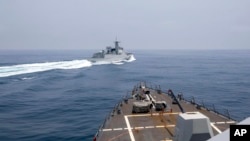The U.S. military on Monday released a video of what it described as an "unsafe" maneuver in the Taiwan Strait over the weekend in which a Chinese navy ship cuts sharply across the path of an American destroyer, forcing the U.S. vessel to slow to avoid a collision.
During the Saturday incident, the U.S. military said, a Chinese guided-missile destroyer overtook the USS Chung-Hoon on its port side, then veered to the right across its bow at a distance of about 137 meters (150 yards), according to the U.S. Indo-Pacific Command. The American destroyer held its course, the video showed, but the military said its speed was reduced to 10 knots "to avoid a collision."
The close encounter occurred as the American vessel and the Canadian frigate HMCS Montreal were conducting a "freedom of navigation" transit of the strait between Taiwan and mainland China, which China claims as part of its economic zone and the U.S. and its Western allies say is governed by the freedom of international passage.
National Security Council spokesperson John Kirby told reporters Monday at the White House that the close encounter in the Taiwan Strait is "part and parcel of an increasing level of aggressiveness" by China's military.
He described the Chinese actions as "unsafe" and "unprofessional" and said such maneuvers could, in the future, lead to "miscalculations."
"It won't be long before somebody gets hurt," he said.
After cutting across the bow of the U.S. ship, the Chinese vessel straightened out to again start sailing in a parallel direction.
The Chinese ship did not attempt a similar maneuver on the Canadian frigate, which was sailing behind the American destroyer.
"Chung-Hoon and Montreal's transit through the Taiwan Strait demonstrates the combined U.S.-Canadian commitment to a free and open Indo-Pacific," the Indo-Pacific Command said. "The U.S. military flies, sails, and operates safely and responsibly anywhere international law allows."
The incident came on a day when both U.S. Defense Secretary Lloyd Austin and Chinese Defense Minister General Li Shangfu were in Singapore for an annual defense conference.
Li defended his country's response Sunday, contending that the passage of the allied Western vessels on "freedom of navigation patrols" was a provocation to China.
Li told some of the world's top defense officials at the Shangri-La Dialogue in Singapore that Beijing does not have any problems with "innocent passage" through the waters separating Taiwan from mainland China but that "we must prevent attempts that try to use those freedom of navigation [patrols], that innocent passage, to exercise hegemony of navigation."
The U.S. Navy's 7th Fleet said in a statement that guided-missile destroyer Chung-Hoon and Royal Canadian Navy Halifax-class frigate HMCS Montreal conducted a routine Taiwan Strait transit "through waters where high-seas freedoms of navigation and overflight apply in accordance with international law."
The bilateral transit, the statement said, "demonstrates the commitment of the United States and our allies and partners to a free and open Indo-Pacific."
China claims Taiwan as part of its territory, and while the U.S. recognizes a "one-China" policy and that Beijing claims Taiwan as its own, Washington continues to sell arms to Taipei.
Li suggested the U.S. and its allies had created the danger and should instead focus on taking "good care of your own territorial airspace and waters."
"The best way is for the countries, especially the naval vessels and fighter jets of countries, not to do closing actions around other countries' territories," he said through an interpreter. "What's the point of going there? In China we always say, 'Mind your own business.'"
Austin told the same security forum Saturday that Washington would not "flinch in the face of bullying or coercion" from China and would continue regularly sailing through and flying over the Taiwan Strait and the South China Sea to emphasize they are international waters, countering Beijing's sweeping territorial claims.
In addition to Saturday's maneuvering in the Taiwan Strait, the U.S. has said a Chinese J-16 fighter jet late last month "performed an unnecessarily aggressive maneuver" while intercepting a U.S. Air Force reconnaissance aircraft over the South China Sea, flying directly in front of the plane's nose.
Li refused Austin's invitation to talk on the sidelines of the conference, though the two did shake hands before sitting down at opposite sides of the same table together as the forum opened Friday.
Austin said that was not enough.
"A cordial handshake over dinner is no substitute for a substantive engagement," Austin said.
Despite the tensions between China and the United States, a senior U.S. diplomat held talks Monday in Beijing with Chinese officials.
The State Department described the talks, which included U.S. Assistant Secretary of State for East Asian and Pacific Affairs Daniel Kritenbrink and Chinese foreign ministry officials Ma Zhaoxu and Yang Tao, as "candid and productive."
The discussions were "part of ongoing efforts to maintain open lines of communication" between the two countries, the State Department said in a statement.
Kritenbrink faced criticism for arriving in Beijing on June 4 — the 34th anniversary of Beijing's 1989 Tiananmen Square crackdown.
Kirby defended the timing of the trip on Monday in his White House briefing, saying that critics "are just making a whole heck of a lot out of nothing."
"We would not call it a misstep," he said in response to a reporter's question. "This was a long-planned trip, and this is the way the schedules worked out."
Some material in this report came from The Associated Press and Reuters.





